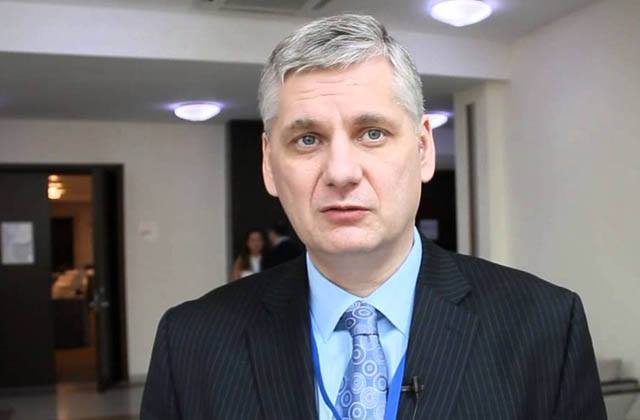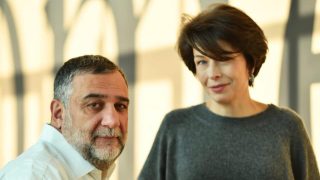Sergey Markedonov on Serzh Sargsyan’s Speech and Developments in Yerevan

“Didn’t putting down the weapons by “Sasna Tsrer” armed group mean, that the authorities succeeded to suspend domestic policy crisis in the country and the protest recorded a decline? It’s a question not without purpose: what lesson should the authorities, the opposition, as well as external actors learn from the July stories, which out of these or those reasons have been involved in the processes of this Transcaucasia state?” Russian analyst Sergey Markedonov raised this rhetoric question in his article covering the developments in Yerevan.
According to him, through the whole period, when “Sasna Tsrer” where in the territory of the police precinct, experts and reporters were stating on information passiveness of Armenia’s authorities, in particular, of RA president Serzh Sargsyan. In his words, there was an impression that country’s number one person intends to take a break, be encouraged prior to the fight, then find necessary words and introduce necessary accentuations.
According to Markedonov, Sezh Sargsyan’s August 1 reflection of Yerevan developments may be observed as official view of July developments, which have been introduced in a concentrated form and which somewhat filled the information gap observed in the activity of the authorities throughout all that epic.
“Firstly Sargsyan particularly stressed, that “I am very glad that we were able to avoid the “classical” scenario of resolving situations such as this one even though the detailed plan for the implementation of such option was certainly on hand too.” In the language of politics and diplomacy it means complete refusal from the attack.
“Last two weeks and the losses we suffered in the course are unacceptable – human, social, loss of values and the huge blow which our economy has suffered. No country in the world can afford such thing to happen; moreover Armenia had no right to do it.” I think Sargsyan was frank while uttering those words.
Firstly, NK conflict, he personally headed defense forces of the non-recognized republic, then the Ministry of Defense of Armenia. Throughout those years he was in the same camp as Jirair Sefilian, and those, coming from Sefilian’s name to demand revolutionary changes from RA authorities. Secondly, as well-known sociologist and political scientist Georgi Derlugyan states, “Taboo of the nation is functioning in Armenia, which revived Genocide. People like us shouldn’t be murdered.”
It can’t be stated that there were no exceptions from this law. The most vivid example in the tragedy of March 2008 with resemblance to 9 January 1905 developments in Russia’s capital was named a “bloody week.” However, they perfectly remember in Armenia, that after those developments on NK contact line the most prominent violations have been observed, and they understand some mutual liaison between those developments.
Moreover, in the context of Armenia’s domestic policy it’s necessary to take into consideration that clashes between the authorities and the opposition in March 2008 obliged Serzh Sargsyan to essentially change his preferences.
As a result, a range of powers, for instance, Armenian National Congress (ANC) appeared in the National Assembly and in the Council of Elders of Yerevan.
In any case both the authorities and the opposition attempt to restrain themselves, realizing that unsettled NK conflict threat is hanging over them. Relations with Turkey are not without clouds either. Like any political figure, Sargsyan clearly drew the red lines, which he isn’t going to surpass. “We will allow no one to undermine the foundation of our state. Problems in Armenia will not be solved through violence or arms. Yerevan is neither Beirut nor Aleppo. Let no one aspire to import Near East solutions of the previous century, of the Cold War to Armenia.”
This was more than a transparent hint to Sefilian and his ”Pre-parliament.” Especially on account of Lebanese roots of that figure,” Markedonov wrote.
According to him the story of seizure of the police precinct once again clearly shaped tendencies hazardous for Armenia—serious protestant moods are available in the Republic, which may outbreak from time to time.
In his qualification Sargsyan’s sentimental tone on Karabakh topic wasn’t unexpected either, “There will be no unilateral concessions in the resolution of the NK issue. Never. Nagorno Karabakh will never be part of Azerbaijan. Never. I repeat once again: it is out of question. I have given my entire adult life to this.”
“Sargsyan mentioned that he won’t go to unilateral resolution. This means the way of compromises is theoretically possible. Of course, under ongoing conditions of conflict and peaceful process they can be speedy,” Markedonov stated. Thus, in his conviction a pause is being recorded in the relations of Armenia’s authorities and the opposition, as the sides will attempt to learn lessons, realize approaches of the opponent, build strategies for the next phase.
“We shouldn’t forget that in 2017 new electoral phase will be launched with the amended Electoral Code. Accordingly protest hasn’t ended, it’s temporarily silent. By the way, it’s forthcoming process depends on the activities of the president’s team and coordinated activities of different opposition branches,” Markedonov wrote.
Prepared by Araks Martirosyan

























